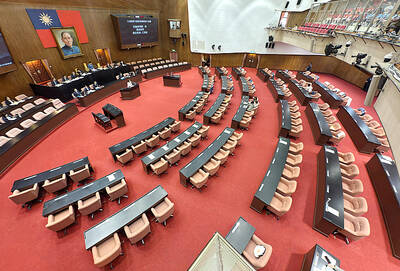Asian stocks posted the biggest weekly advance in more than a month on signs corporate earnings were improving and as concern eased that European nation’s mounting debt will wreck the global economic recovery.
Tencent Holdings Ltd (騰訊), China’s largest Internet company by market value, jumped 6.2 percent this week as earnings surged. Isuzu Motors Ltd soared 11 percent in Tokyo as it forecast earnings will more than double. Australia & New Zealand Banking Group Ltd climbed 4.5 percent as European policymakers unveiled loan packages for debt-laden nations.
The MSCI Asia-Pacific Index rose about 1.6 percent to 120.00 this week, the most since the period ended April 4. The index has fallen about 7.1 percent from a 20-month high on April 15, as Europe’s debt crisis and concern China will quell inflation eroded confidence in the global economic recovery.
“The underlying message from the economy and corporate earnings is that we’re on the recovery path,” said Prasad Patkar, who helps manage US$1.7 billion in Sydney at Platypus Asset Management Ltd. “The disruptions in the European Union over the last few weeks could have interfered with that process of healing. But the decisive action taken means the recovery won’t get cut short.”
Australia’s S&P/ASX 200 Index and South Korea’s KOSPI Index both advanced 2.9 percent this week. The Nikkei 225 Stock Average rose 0.9 percent in Tokyo.
The Philippines Stock Exchange Index surged 6 percent, the biggest weekly climb in a year, as Benigno Aquino headed for a landslide presidential election victory, easing concern the result would be contested.
“The upward momentum for corporate earnings will continue and that’s where investors will focus,” said Kiyoshi Ishigane, a strategist in Tokyo at Mitsubishi UFJ Asset Management Co, which oversees about US$64 billion.
Analysts expect earnings per share at companies in the MSCI Asia-Pacific Index to rise 53 percent in the next 12 months, compared with 26 percent for those in the S&P 500 and 38 percent for those in the STOXX Europe 600 Index, according to data compiled by Bloomberg.
On Tuesday, the Shanghai Composite Index entered a so-called bear market after having lost 21 percent from its Nov. 23 high on concern China intensified steps to cool its property market. Chinese consumer prices rose last month at the fastest pace in 18 months, and property prices jumped a record 12.8 percent, China’s statistics bureau said this week.
The TAIEX climbed 1.6 points on Friday to close at 7,772.13. The index rose 2.7 percent this week, the first weekly gain in four.
Asustek Computer Inc (華碩電腦), the maker of the Eee PC low-cost notebook, declined 5.1 percent to NT$50.50, the lowest since Aug. 6. Shipments of computers to Europe may be cut because a falling euro reduces the NT dollar value of its sales, chief executive officer Jerry Shen (沈振來) said on Thursday.
Chimei Innolux Corp (奇美電子), Taiwan’s biggest maker of LCDs, fell 0.6 percent to NT$39.60, the lowest since May 7. The company’s board approved a plan to buy back and cancel 732 million preferred shares.

The Chien Feng IV (勁蜂, Mighty Hornet) loitering munition is on track to enter flight tests next month in connection with potential adoption by Taiwanese and US armed forces, a government source said yesterday. The kamikaze drone, which boasts a range of 1,000km, debuted at the Taipei Aerospace and Defense Technology Exhibition in September, the official said on condition of anonymity. The Chungshan Institute of Science and Technology and US-based Kratos Defense jointly developed the platform by leveraging the engine and airframe of the latter’s MQM-178 Firejet target drone, they said. The uncrewed aerial vehicle is designed to utilize an artificial intelligence computer

The Chinese Nationalist Party (KMT) caucus yesterday decided to shelve proposed legislation that would give elected officials full control over their stipends, saying it would wait for a consensus to be reached before acting. KMT Legislator Chen Yu-jen (陳玉珍) last week proposed amendments to the Organic Act of the Legislative Yuan (立法院組織法) and the Regulations on Allowances for Elected Representatives and Subsidies for Village Chiefs (地方民意代表費用支給及村里長事務補助費補助條例), which would give legislators and councilors the freedom to use their allowances without providing invoices for reimbursement. The proposal immediately drew criticism, amid reports that several legislators face possible charges of embezzling fees intended to pay

REQUIREMENTS: The US defense secretary must submit a Taiwan security assistance road map and an appraisal of Washington’s ability to respond to Indo-Pacific conflict The US Congress has released a new draft of the National Defense Authorization Act (NDAA), which includes up to US$1 billion in funding for Taiwan-related security cooperation next year. The version published on Sunday by US House of Representatives Speaker Mike Johnson removed earlier language that would have invited Taiwan to participate in the US-led Rim of the Pacific Exercise (RIMPAC). A statement on Johnson’s Web page said the NDAA “enhances U.S. defense initiatives in the Indo-Pacific to bolster Taiwan’s defense and support Indo-Pacific allies.” The bill would require the US secretary of defense to “enable fielding of uncrewed and anti-uncrewed systems capabilities”

Renewed border fighting between Thailand and Cambodia showed no signs of abating yesterday, leaving hundreds of thousands of displaced people in both countries living in strained conditions as more flooded into temporary shelters. Reporters on the Thai side of the border heard sounds of outgoing, indirect fire yesterday. About 400,000 people have been evacuated from affected areas in Thailand and about 700 schools closed while fighting was ongoing in four border provinces, said Thai Rear Admiral Surasant Kongsiri, a spokesman for the military. Cambodia evacuated more than 127,000 villagers and closed hundreds of schools, the Thai Ministry of Defense said. Thailand’s military announced that